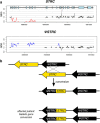Copy number variants are a common cause of non-syndromic hearing loss
- PMID: 24963352
- PMCID: PMC4067994
- DOI: 10.1186/gm554
Copy number variants are a common cause of non-syndromic hearing loss
Abstract
Background: Copy number variants (CNVs) are a well-recognized cause of genetic disease; however, methods for their identification are often gene-specific, excluded as 'routine' in screens of genetically heterogeneous disorders, and not implemented in most next-generation sequencing pipelines. For this reason, the contribution of CNVs to non-syndromic hearing loss (NSHL) is most likely under-recognized. We aimed to incorporate a method for CNV identification as part of our standard analysis pipeline and to determine the contribution of CNVs to genetic hearing loss.
Methods: We used targeted genomic enrichment and massively parallel sequencing to isolate and sequence all exons of all genes known to cause NSHL. We completed testing on 686 patients with hearing loss with no exclusions based on type of hearing loss or any other clinical features. For analysis we used an integrated method for detection of single nucleotide changes, indels and CNVs. CNVs were identified using a previously published method that utilizes median read-depth ratios and a sliding-window approach.
Results: Of 686 patients tested, 15.2% (104) carried at least one CNV within a known deafness gene. Of the 38.9% (267) of individuals for whom we were able to determine a genetic cause of hearing loss, a CNV was implicated in 18.7% (50). We identified CNVs in 16 different genes including 7 genes for which no CNVs have been previously reported. CNVs of STRC were most common (73% of CNVs identified) followed by CNVs of OTOA (13% of CNVs identified).
Conclusion: CNVs are an important cause of NSHL and their detection must be included in comprehensive genetic testing for hearing loss.
Figures



Similar articles
-
Detection and Confirmation of Deafness-Causing Copy Number Variations in the STRC Gene by Massively Parallel Sequencing and Comparative Genomic Hybridization.Ann Otol Rhinol Laryngol. 2016 Nov;125(11):918-923. doi: 10.1177/0003489416661345. Epub 2016 Jul 28. Ann Otol Rhinol Laryngol. 2016. PMID: 27469136 Free PMC article.
-
Evaluation of copy number variants for genetic hearing loss: a review of current approaches and recent findings.Hum Genet. 2022 Apr;141(3-4):387-400. doi: 10.1007/s00439-021-02365-1. Epub 2021 Nov 22. Hum Genet. 2022. PMID: 34811589 Review.
-
STRC Gene Mutations, Mainly Large Deletions, are a Very Important Cause of Early-Onset Hereditary Hearing Loss in the Czech Population.Genet Test Mol Biomarkers. 2018 Feb;22(2):127-134. doi: 10.1089/gtmb.2017.0155. Genet Test Mol Biomarkers. 2018. PMID: 29425068
-
DNA Diagnostics of Hereditary Hearing Loss: A Targeted Resequencing Approach Combined with a Mutation Classification System.Hum Mutat. 2016 Aug;37(8):812-9. doi: 10.1002/humu.22999. Epub 2016 May 6. Hum Mutat. 2016. PMID: 27068579
-
Utility of droplet digital PCR and NGS-based CNV clinical assays in hearing loss diagnostics: current status and future prospects.Expert Rev Mol Diagn. 2021 Feb;21(2):213-221. doi: 10.1080/14737159.2021.1887731. Epub 2021 Feb 26. Expert Rev Mol Diagn. 2021. PMID: 33554673 Review.
Cited by
-
Contiguous Gene Syndromes and Hearing Loss: A Clinical Report of Xq21 Deletion and Comprehensive Literature Review.Genes (Basel). 2024 May 23;15(6):677. doi: 10.3390/genes15060677. Genes (Basel). 2024. PMID: 38927613 Free PMC article. Review.
-
Unraveling of Enigmatic Hearing-Impaired GJB2 Single Heterozygotes by Massive Parallel Sequencing: DFNB1 or Not?Medicine (Baltimore). 2016 Apr;95(14):e3029. doi: 10.1097/MD.0000000000003029. Medicine (Baltimore). 2016. PMID: 27057829 Free PMC article.
-
SIX2 haploinsufficiency causes conductive hearing loss with ptosis in humans.J Hum Genet. 2016 Nov;61(11):917-922. doi: 10.1038/jhg.2016.86. Epub 2016 Jul 7. J Hum Genet. 2016. PMID: 27383657 Free PMC article.
-
Prenatal cytogenomic identification and molecular refinement of compound heterozygous STRC deletion breakpoints.Mol Genet Genomic Med. 2019 Aug;7(8):e806. doi: 10.1002/mgg3.806. Epub 2019 Jun 19. Mol Genet Genomic Med. 2019. PMID: 31218851 Free PMC article.
-
Utilizing ethnic-specific differences in minor allele frequency to recategorize reported pathogenic deafness variants.Am J Hum Genet. 2014 Oct 2;95(4):445-53. doi: 10.1016/j.ajhg.2014.09.001. Epub 2014 Sep 25. Am J Hum Genet. 2014. PMID: 25262649 Free PMC article.
References
-
- Stenson PD, Mort M, Ball EV, Shaw K, Phillips AD, Coooper DN. The Human Gene Mutation Database: building a comprehensive mutation repository for clinical and molecular genetics, diagnostic testing and personalized genomic medicine. Hum Genet. 2014;133:1–9. doi: 10.1007/s00439-013-1358-4. - DOI - PMC - PubMed
-
- Verpy E, Masmoudi S, Zwaenepoel I, Leibovici M, Hutchin TP, del Castillo I, Nouaille S, Blanchard S, Lainé S, Popot JL, Moreno F, Mueller RF, Petit C. Mutations in a new gene encoding a protein of the hair bundle cause non-syndromic deafness at the DFNB16 locus. Nat Genet. 2001;29:345–349. doi: 10.1038/ng726. - DOI - PubMed
Grants and funding
LinkOut - more resources
Full Text Sources
Other Literature Sources
Molecular Biology Databases

